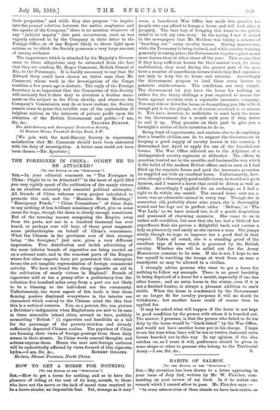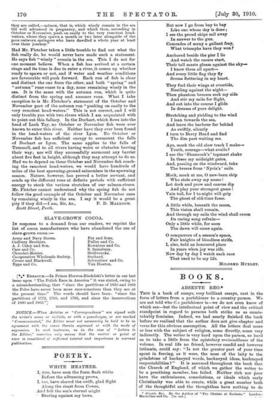HABITS OF SALMON.
[TO THE EDITOR OF THE "srscrAroa."1 SIR,—My attention has been drawn to a letter appearing in your issue of July 2nd, written by Mr. W. Fletcher, com- menting on your review of my book. In it he makes one remark which I cannot allow to pass. Mr. Fletcher says :-
" In every salmon-river of these islands we have back-enders, as
they are called,—salmon, that is, which wisely remain in the sea till well advanced in pregnancy, and which then, ascending in October or November, push on easily to the very remotest head- waters, where they spawn a month or two later alongside of the poor outworn springers who have dawdled a whole year at least over their journey."
Had Mr. Fletcher taken a little trouble to find out what the fish really do, he would never have made such a statement. He says fish "wisely " remain in the sea. This I do not for one moment believe. When a fish has arrived at a certain stage and its time is due to enter a river, it comes up whether ready to spawn or not, and if water and weather conditions are favourable will push forward. Each ran of fish is clear and distinct the one from the other, and both " spring " and "autumn" runs cease to a day, none remaining wisely in the sea. It is the same with the autumn run, which is quite distinct from the spring and summer runs. What I take exception to is Mr. Fletcher's statement of the October and November part of the autumn run " pushing on easily to the very remotest head-waters." This is not correct, and I will only trouble you with two rivers which I am acquainted with to point out this fallacy. In the Dochart, which flows into the head of Loch Tay, no October or November fish were ever known to enter this river. Neither have they ever been found in the head-waters of the river Lyon. No October or November fish has sufficient energy to surmount the falls of Dochart or Lyon. The same applies to the falls of Tummell, and to all rivers having weirs or obstacles barring their way; nor will they successfully surmount any barrier about five feet in height, although they may attempt to do so. Had we to depend on these October and November fish reach- ing the remotest head-waters, we would have hundreds of miles of the best spawning-ground salmonless in the spawning season. Nature, however, has proved a better servant, and sends up the different runs at definite periods with sufficient energy to stock the various stretches of our salmon-rivers.
Mr. Fletcher cannot understand why the spring fish do not follow the good example of the October and November ones by remaining wisely in the sea. I say it would be a great pity if they am, Sir, &c., P. D. MALLOCH.
Scott Street, Perth.







































 Previous page
Previous page